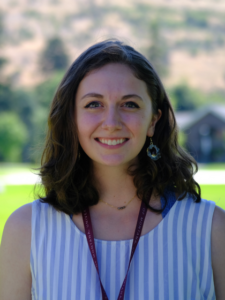On Second-Year Service by Amelia Huba

If you told me in August 2022 that I would willingly sign up for a second year of service, it would have seemed unrealistic – I was already homesick on the 30-hour drive here! If you’d told me the same thing in January 2023 I would have laughed out loud. Why would I sign up to stay in a place where winters mean below zero degrees and where there are chances of snow through June? I came to Montana expecting to have one year of incredible experiences and impactful service. I certainly got that, but I also came to care deeply about what I was doing and the community I had found myself in. There were projects I felt I was just starting and I really wanted to see them through. I’ll hopefully be finishing my masters degree in August 2024, so it seemed like the natural choice to take a second year doing something I love in a place this beautiful while I finish pursuing that dream.
If you asked me now if I’ll do yet another year, my answer would be no. One of the most valuable lessons I’ve learned over the last year and change is that I could never do this as a career. Of course I enjoy what I do and I care deeply about the students I interact with, but there is such an emotional weight to this position. I admire and applaud those who are able to work with homeless teenagers for years on end. My supervisor, Anna Edwards, is in her 12th year in her role and she’s absolutely my hero.
Social work is a field that practically demands emotional cost from those working in it – similarly to EMTs, 911 operators, and ER nurses and doctors. These are all roles that have to be filled but there is no chance of working in them without being impacted by what you see, hear, and do every day. I think this is understood by those who enter into these fields, and there are support services built around many of these roles.
As AmeriCorps VISTAs, we are asked to serve the goal of alleviating poverty. In the roles of several of us at MTCC, this involves working closely with members of the community who are struggling. We’re not meant to do direct service, so this is not necessarily an expected part of the position, but nonetheless it happens. In my case, my desk is in a classroom in a high school. When Anna is meeting with parents in the community or visiting other schools, the classroom becomes my responsibility. Last year, this felt overwhelming but manageable; I was not the only line of defense because I had another VISTA with me to answer students’ questions and requests. This year, it feels heavier. We aren’t trained social workers; there aren’t support services readily available to us. The best I can do is try to remain professional when talking to the students. Try to find them resources. Try to care just the right amount. I don’t want to depersonalize these children; knowing their faces and names and stories helps remind me just how critically important my job is. Caring too little isn’t a concern, but caring too much definitely is. Last year, I dreaded the snow because I’m not a great skier and I was worried I’d get bored. This year, I’m dreading the snow because there’s a teenage girl sleeping in a tent because she doesn’t feel safe at the Warming Center.
In my last blog posts, I wrote a lot about community and some of the people who have changed my life while I’ve lived in Montana. Whether or not I was expecting it when I signed up (either time), I am a part of these students’ community. They trust me enough to talk to me about what’s going on in their lives. We both know there’s little I can do but listen. I’m trying to approach this as the gift that it is; a traumatized child knows that I’m a safe person. Their questions still weigh on me. What do you say to a 15 year old who asks about the odds that pulling out her own tooth will kill her? How do you gently explain the risk of nerve damage and sepsis while also trying to find a dental office that accepts Medicaid? When she tells you her mom’s Medicaid was canceled and they can’t afford to go to the doctor, what’s the next step? The mental and emotional weight put on us as temporary government volunteers would be laughable if it wasn’t so bleak.
I could never do this as a career. After I finish service, after I leave Bozeman and Montana, these kids will stay in my thoughts. Only a year and a few months worth of names and faces and stories and I know I’m simply not capable of caring the right amount. I don’t regret a moment of it, though. This experience has given me so much insight into the struggles faced by these students and the struggles faced by the people trying to help. I’ve also gained insight into exactly where current policy fails and how one change could make a huge difference for homeless students, for school administrators, and for the community as a whole. When I leave with a masters degree and two years of these insights, I fully intend to keep trying to alleviate poverty as a career. I’ve got big plans for myself, and I will never forget how important it has been to be a part of these students’ community, even for a short time.
 Blog
Blog